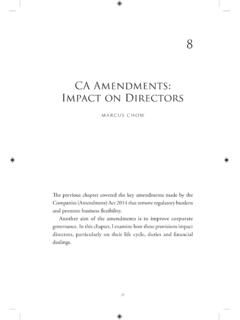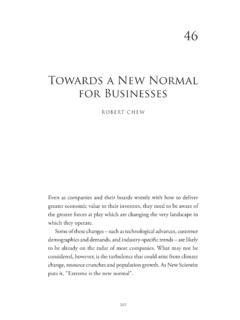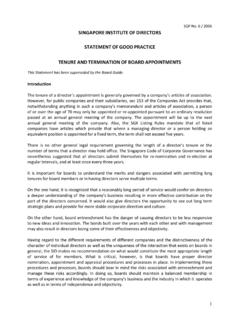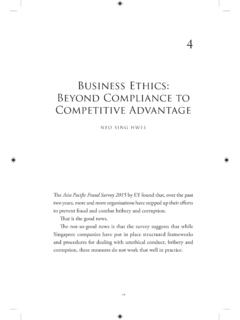Transcription of TENURE AND TERMINATION OF BOARD …
1 1 SGP No. 6 / 2006 SINGAPORE INSTITUTE OF DIRECTORS STATEMENT OF GOOD PRACTICE TENURE AND TERMINATION OF BOARD APPOINTMENTS This Statement has been superseded by the BOARD Guide. Introduction The TENURE of a director s appointment is generally governed by a company s articles of association. However, for public companies and their subsidiaries, sec 153 of the Companies Act provides that, notwithstanding anything in such a company s memorandum and articles of association, a person of or over the age of 70 may only be appointed or re appointed pursuant to an ordinary resolution passed at an annual general meeting of the company. The appointment will be up to the next annual general meeting of the company.
2 Also, the SGX Listing Rules mandate that all listed companies have articles which provide that where a managing director or a person holding an equivalent position is appointed for a fixed term, the term shall not exceed five years. There is no other general legal requirement governing the length of a director s TENURE or the number of terms that a director may hold office. The Singapore Code of Corporate Governance has nevertheless suggested that all directors submit themselves for re nomination and re election at regular intervals, and at least once every three years. It is important for boards to understand the merits and dangers associated with permitting long tenures for BOARD members or in having directors serve multiple terms. On the one hand, it is recognized that a reasonably long period of service would confer on directors a deeper understanding of the company s business resulting in more effective contribution on the part of the directors concerned.
3 It would also give directors the opportunity to see out long term strategic plans and provide for more stable corporate direction and culture. On the other hand, BOARD entrenchment has the danger of causing directors to be less responsive to new ideas and innovation. The bonds built over the years with each other and with management may also result in directors losing some of their effectiveness and objectivity. Having regard to the different requirements of different companies and the distinctiveness of the character of individual directors as well as the uniqueness of the interaction that exists on boards in general, the SID makes no recommendation on what would constitute the most appropriate length of service of for members. What is critical, however, is that boards have proper director nomination, appointment and appraisal procedures and processes in place.
4 In implementing these procedures and processes, boards should bear in mind the risks associated with entrenchment and manage these risks accordingly. In doing so, boards should maintain a balanced membership in terms of experience and knowledge of the company s business and the industry in which it operates as well as in terms of independence and objectivity. 2 A person s TENURE of directorship may come to an end in any of the following ways: retirement; resignation on the part of the director; removal of the director; vacation of office under other circumstances provided for in the company s articles; in the case of public companies and their subsidiaries, at the annual general meeting commencing next upon the director attaining the age of 70. It is incumbent upon directors to carry out their duties right up to the time that they cease to be directors.
5 They should also be aware that they remain liable (subject to any time limitations prescribed by law) for acts, omissions and decisions made during the term of their office. TERMINATION of Directorship 1. Retirement Retirement normally takes place in accordance with the provisions of the company s articles of association. It may also take effect upon the expiration of any specified term for which the director has been appointed. The usual provisions found in the articles of association of companies provide for the following: at least one third (or the number nearest to but not greater than one third in cases where the number of directors is not a multiple of three) shall retire from office at each general meeting; the following persons are normally not subject to rotation the managing director, directors who are nominated onto the BOARD by persons who are given a specific right to make such nomination either under the articles or a contract.
6 The retiring directors shall include any director who is due to retire at the meeting by reason of age either pursuant to the articles or, in the case of public companies and their subsidiaries, upon the director having attained the age of 70 prior to the meeting (see discussion in paragraph 5 below). Retiring directors shall also include directors who wish to retire and not seek re election; and 3 where the number of directors retiring for the reasons mentioned in the preceding paragraph are less than the required one third, further directors to retire shall be those who are subject to retirement by rotation and who have been longest in office since their last re election. As a matter of good practice, it is recommended that all companies consider adopting articles to similar effect.
7 2. Resignation A corollary consequence to the principle that no director may be appointed as such without his consent is that directors are generally free to resign from office. The only exception is where the director s resignation will leave the company with no director who is ordinarily resident in Singapore, in which case, any purported attempt at resignation will be invalid (sec 145(5) of the Companies Act). Where a director wishes to resign, he must comply with the procedures provided for under the company s articles. The usual practice is to require the director to send a written notice of resignation to the company s registered office. The notice should be addressed to the company s BOARD of directors and takes effect upon being received by the company at its registered office.
8 The resignation need not be accepted by the BOARD for it to be effective. In addition, the company will have to lodge a prescribed notice of the director s vacation of office (whether by resignation or otherwise) with the Registrar within one month of a person ceasing to be a director of the company. Directors who resign should satisfy themselves that this has been done, failing which they should take the necessary steps to notify the Registrar of their resignation. The decision to resign from office is one that should not be taken lightly. Directors should understand that expertise and experience are not easily replaceable. It is also possible that their resignation may be taken negatively against the company and affect stakeholder confidence in the company. They should therefore take every step to try to manage the situation and should only resort to resigning as a last resort.
9 Where it is decided to proceed with the resignation, directors should consider carefully whether the reasons should be made known to shareholders. Difficult issues involving loyalty to the company and confidentiality of company information can arise. There may also be situations where directors may need to consider the implications of statements that they make, particularly if they concern the conduct of their fellow directors. It would be prudent to seek legal advice in such situations. The following situations either taken alone or in combination may warrant resignation: major conflicts of interest ; concern over the position of the company; serious dissent with fellow BOARD members; 4 loss of confidence in the director s ability to serve on the BOARD ; personal reasons.
10 Major conflicts of interest : A serious continuing conflict of interest that cannot be resolved may warrant resignation. The procedures and best practices relating to directors conflicts of interest are discussed in greater detail under the Statement of Good Practice for conflicts of interest ([to cite reference no.]). These procedures should be adhered to at first instance. Resignation should be contemplated where the conflict is of a nature such that: there is a likelihood for the company to be prejudiced as a result; or the director is unable to act effectively in the interests of the company and in the performance of his duties as a result of the conflict. Prior to resigning on this ground, directors should discuss the matter with the Chairman or the chairman of the Nominating Committee who will then decide whether the matter should be brought to the attention of the BOARD .








